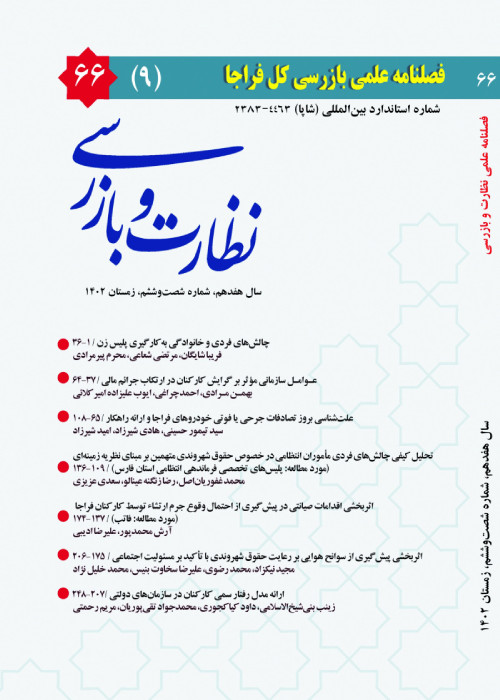Examples of criminology in criminal documents and laws of the Islamic Republic of Iran
This research has addressed the most important examples of falsehood in binding documents and criminal laws (substantive and formal) and from the point of view, it is applied in a descriptive-analytical way. Undoubtedly, Islamic teachings, Quranic rulings, hadiths and jurisprudential texts have played an important role in compiling, approving and strengthening the customary laws of the Islamic Republic of Iran, among which we can point out the covering up of defects and the covering up of some extreme crimes.
The current research is based on descriptive and analytical method. In this method, by using library studies, detailed and comprehensive investigations have been conducted on the examples and effects of criminal cover-up in criminal laws and binding documents.
Hiding and concealing is a non-criminal and non-coercive method, which has received special attention from the legislator and is included in some binding documents such as the charter of citizenship rights, the eight-point decree of Imam Khomeini (RA), some principles of the constitution and some Substantial and formal laws have found a special place and have influenced the judicial system in dealing with some criminals of extreme crimes and against chastity, so that instead of using the maximum penalty and filing court cases, they have mostly benefited from neglect and neglect. to be Although the use of this theory in criminal laws and the judicial system is useful and effective in many cases, if it is not implemented accurately and completely, it can cause harm.
Therefore, exceptional scapegoating is based on the principle of criminal prosecution, the examples of which are found in some limited (moral) and punishment crimes against chastity in terms of circumstances. This distinctive approach and method, which has commonalities and differences with some modern Western criminological ideas such as labeling, decriminalization, deprosecution, restorative justice and criminal abolitionism, is in the new changes and developments of the Iranian legislature and judicial system regarding penal crimes. It also has an important role and has made a significant contribution to the formation of some legal institutions such as the issuing of suspension of prosecution orders, postponement of prosecution and archiving of criminal cases.
- حق عضویت دریافتی صرف حمایت از نشریات عضو و نگهداری، تکمیل و توسعه مگیران میشود.
- پرداخت حق اشتراک و دانلود مقالات اجازه بازنشر آن در سایر رسانههای چاپی و دیجیتال را به کاربر نمیدهد.


